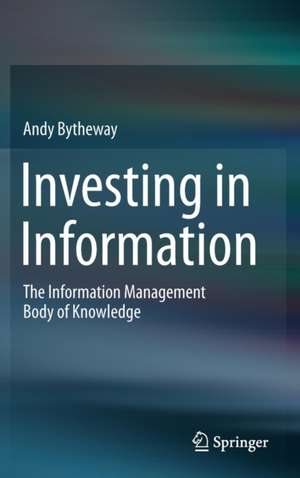Investing in Information: The Information Management Body of Knowledge
Autor Andy Bythewayen Limba Engleză Hardback – 10 dec 2014
The book differs from other books in its reflective approach. It avoids lengthy, descriptive, and prescriptive dogma. Rather, it provides tools for thinking about information management and it identifies strategic and tactical options at six levels: from the simple consideration of information technology and information systems, right through to issues of organisational performance and business strategy. At the heart of the matter are two critical and tightly connected issues: the ways that we conceive and manage an organisation’s processes, and the ways that we conceive and manage the information that an organisation needs to sustain those processes. The six-level framework that achieves this clarity is the “Information Management Body of Knowledge” (familiarly known as the “IMBOK”). This easy-to-understand and easy-to-remember framework has been found to be extremely useful in business, in government, in civil society and in education. Throughout the book, selected research papers are identified and summarised. There are also summary chapters from three different operational perspectives: performance and competency assessment using the IMBOK, undertaking research into related issues, and a review of parallel expert thinking.
This book standsas a reference point and resource for all those who need to straddle the disparate worlds of “information technology” and “business”. It provides firm pedagogical foundations for courses dealing with business management in the information age, and it provides a sound reference framework for researchers who need to position research projects related to information technology and information systems in a wider context. For busy managers, who simply wish to identify, understand and successfully manage information technology-related opportunities, it provides an ideal arrangement of ideas and tools that will help them.
| Toate formatele și edițiile | Preț | Express |
|---|---|---|
| Paperback (1) | 388.34 lei 6-8 săpt. | |
| Springer International Publishing – 10 sep 2016 | 388.34 lei 6-8 săpt. | |
| Hardback (1) | 501.41 lei 6-8 săpt. | |
| Springer International Publishing – 10 dec 2014 | 501.41 lei 6-8 săpt. |
Preț: 501.41 lei
Nou
Puncte Express: 752
Preț estimativ în valută:
95.94€ • 99.98$ • 79.44£
95.94€ • 99.98$ • 79.44£
Carte tipărită la comandă
Livrare economică 03-17 aprilie
Preluare comenzi: 021 569.72.76
Specificații
ISBN-13: 9783319119083
ISBN-10: 3319119087
Pagini: 280
Ilustrații: XVI, 280 p. 61 illus., 5 illus. in color.
Dimensiuni: 155 x 235 x 22 mm
Greutate: 0.74 kg
Ediția:2014
Editura: Springer International Publishing
Colecția Springer
Locul publicării:Cham, Switzerland
ISBN-10: 3319119087
Pagini: 280
Ilustrații: XVI, 280 p. 61 illus., 5 illus. in color.
Dimensiuni: 155 x 235 x 22 mm
Greutate: 0.74 kg
Ediția:2014
Editura: Springer International Publishing
Colecția Springer
Locul publicării:Cham, Switzerland
Public țintă
ResearchCuprins
Part I: Taking Stock.- 1. Introduction.- 2. The Information Management Body of Knowledge.- Part II: Exploring Information Management.- 3. Exploring Information Technology.- 4. Exploring Information Systems.- 5. Exploring Business Processes.- 6. Exploring Business Information.- 7. Exploring Business Benefits.- 8. Exploring Business Strategy.- Part III: Operationalising Information Management.- 9. Assessing Information Management Capability.- 10. Researching Information Management.- 11. Some Models and Frameworks Reviewed.
Recenzii
“I wish I could have read this book when I was younger. (…)This book is as essential read for technical specialists and business generalists who want to see the big picture and create more value together.” - Ernest Hughes, Computing Reviews, February 2015
Notă biografică
Andy Bytheway is presently researching information systems engineering standards at the University of the Western Cape in South Africa. Over the last 16 years, working first as Professor of Information Systems and then of Information Management, he has developed and tested the IMBOK in different contexts. Prior to 1998 he was a Research Fellow at the Cranfield School of Management in the UK. He has led international work on standards for information systems engineering, and he has authored more than 100 practitioner and academic reports and papers; this is his fourth book.
Textul de pe ultima copertă
This book gathers together, in a new way, established and contemporary thinking about how to get the best out of information technology and information systems investments. Working managers who are beset by the complexities of information management in the age of Big Data and the Social Web, and students who are trying to make sense of information management in a chaotic world that is more and more driven by the Internet, will all benefit from this new treatment of a long-standing and problematic domain. Importantly, the book reveals and clarifies the dependencies that exist between the inner world of information technology and the outer world of people and organisations at work.
The book differs from other books in its reflective approach. It avoids lengthy, descriptive, and prescriptive dogma. Rather, it provides tools for thinking about information management and it identifies strategic and tactical options at six levels: from the simple consideration of information technology and information systems, right through to issues of organisational performance and business strategy. At the heart of the matter are two critical and tightly connected issues: the ways that we conceive and manage an organisation’s processes, and the ways that we conceive and manage the information that an organisation needs to sustain those processes. The six-level framework that achieves this clarity is the “Information Management Body of Knowledge” (familiarly known as the “IMBOK”). This easy-to-understand and easy-to-remember framework has been found to be extremely useful in business, in government, in civil society and in education. Throughout the book, selected research papers are identified and summarised. There are also summary chapters from three different operational perspectives: performance and competency assessment using the IMBOK, undertaking research into related issues, and a review of parallel expert thinking.
This book stands as a reference point and resource for all those who need to straddle the disparate worlds of “information technology” and “business”. It provides firm pedagogical foundations for courses dealing with business management in the information age, and it provides a sound reference framework for researchers who need to position research projects related to information technology and information systems in a wider context. For busy managers, who simply wish to identify, understand and successfully manage information technology-related opportunities, it provides an ideal arrangement of ideas and tools that will help them.
The book differs from other books in its reflective approach. It avoids lengthy, descriptive, and prescriptive dogma. Rather, it provides tools for thinking about information management and it identifies strategic and tactical options at six levels: from the simple consideration of information technology and information systems, right through to issues of organisational performance and business strategy. At the heart of the matter are two critical and tightly connected issues: the ways that we conceive and manage an organisation’s processes, and the ways that we conceive and manage the information that an organisation needs to sustain those processes. The six-level framework that achieves this clarity is the “Information Management Body of Knowledge” (familiarly known as the “IMBOK”). This easy-to-understand and easy-to-remember framework has been found to be extremely useful in business, in government, in civil society and in education. Throughout the book, selected research papers are identified and summarised. There are also summary chapters from three different operational perspectives: performance and competency assessment using the IMBOK, undertaking research into related issues, and a review of parallel expert thinking.
This book stands as a reference point and resource for all those who need to straddle the disparate worlds of “information technology” and “business”. It provides firm pedagogical foundations for courses dealing with business management in the information age, and it provides a sound reference framework for researchers who need to position research projects related to information technology and information systems in a wider context. For busy managers, who simply wish to identify, understand and successfully manage information technology-related opportunities, it provides an ideal arrangement of ideas and tools that will help them.
Caracteristici
A new framework for functional and specialist managers, providing a basis for information management competency assessment and capability development A focus on the dual issues of process management and information management, both of which stand at the intersection of technology and business Selected references to contemporary research, summarised here in order to illustrate and substantiate important current issues Includes supplementary material: sn.pub/extras










